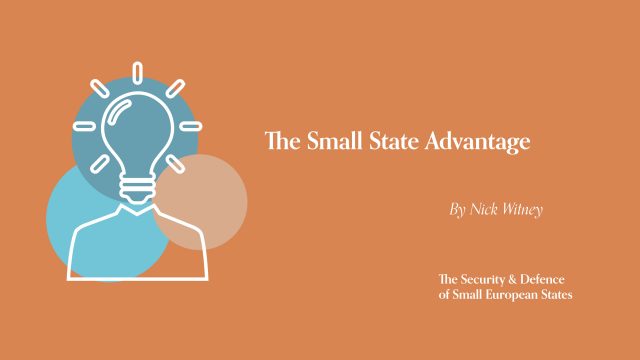The Small State Advantage

Author: Nick Witney
Is it really useful to think about ‘small states’ when discussing European defence and security? After all, as a Danish minister memorably remarked a couple of years back, “There are two kinds of European nations -- there are small nations and there are countries that have not yet realised they are small nations.”
Besides, just how much commonality of outlook should one expect to find between, say, Ireland and Latvia, or Slovenia? None of us can escape our particular geographical location, or our neighbours, and these factors will inevitably impact on our security thinking and priorities more than questions of relative size. And then there is history, and how it has shaped our various senses of who we are, and what role we should seek to play in the world. Look at the islands of the north-east Atlantic: it is not just size, or indeed geography, which can explain the vast differences in strategic identity between Britain, and Ireland, and Iceland.
All that said, there are at least two respects in which the attribute of smallness may be a positive asset for a European state concerned to contribute (as, in my view, we all should be) to the strengthening of European defence and security.
The first is peace support operations. So-called ‘liberal interventionism’ has a bad name in recent years. Deployment of defence forces overseas is dangerous, and expensive, and seldom a complete answer to anything. But it is also often essential, to prevent bad turning to worse, and as a support to a rules-based international order which is now looking increasingly battered. And such interventions are likely to stand a better chance of success the less they are perceived to be part of some ‘great power’ agenda. Small states have a ‘brand advantage’ for such roles especially if, like Ireland, they have built their reputation over decades.
The second area of comparative advantage for small states should be, to use a fashionable term, ‘thought leadership’. President Macron caused a recent stir by characterising NATO as “brain-dead”. He might well have applied the criticism to defence establishments across Europe. The need for greater pooling of efforts and resources across Europe has been received wisdom for literally decades; but the progress of the Common Security and Defence Policy has been laboured at best.
Today, the need for Europeans to take responsibility for their own defence, and to protect and build their strategic sovereignty, has never been clearer. But in most of Europe’s capitals the preference is to respond to the tectonic changes in our shared strategic environment by keeping heads down and hoping for the best.
This immobility is partly cultural – the whole point of defence, after all, is to protect the status quo – and partly the effect of vested interest. Large defence establishments are deeply invested, literally and figuratively, in things carrying on as before. Thus although the British, in their 2015 Strategic Review, managed to get as far as diagnosing their top security threats as cyber-attack and terrorism, they could not get beyond prescribing two large aircraft carriers as the answer.
Someone needs to come to the conference rooms of Brussels and argue compellingly for Europeans to shift their defence investment from heavy metal and high explosive to cyber and AI – just as someone needs to come and offer ideas on how Europeans should respond to the collapse of the global arms control regime in ways more effective than deploring it. What European defence and security needs more than anything else today is brave analysis and fresh ideas. But don’t look to big states to provide them.
Disclaimer: The views expressed in this blog are those of the author, and not the IIEA.
